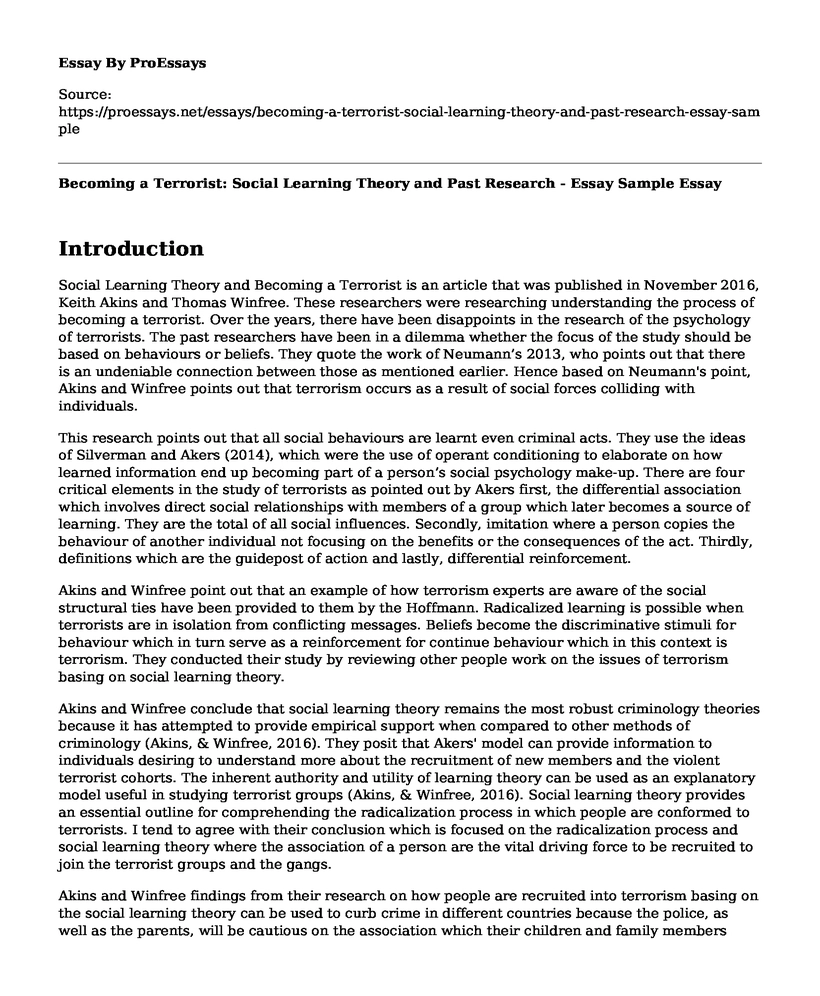Introduction
Social Learning Theory and Becoming a Terrorist is an article that was published in November 2016, Keith Akins and Thomas Winfree. These researchers were researching understanding the process of becoming a terrorist. Over the years, there have been disappoints in the research of the psychology of terrorists. The past researchers have been in a dilemma whether the focus of the study should be based on behaviours or beliefs. They quote the work of Neumann’s 2013, who points out that there is an undeniable connection between those as mentioned earlier. Hence based on Neumann's point, Akins and Winfree points out that terrorism occurs as a result of social forces colliding with individuals.
This research points out that all social behaviours are learnt even criminal acts. They use the ideas of Silverman and Akers (2014), which were the use of operant conditioning to elaborate on how learned information end up becoming part of a person’s social psychology make-up. There are four critical elements in the study of terrorists as pointed out by Akers first, the differential association which involves direct social relationships with members of a group which later becomes a source of learning. They are the total of all social influences. Secondly, imitation where a person copies the behaviour of another individual not focusing on the benefits or the consequences of the act. Thirdly, definitions which are the guidepost of action and lastly, differential reinforcement.
Akins and Winfree point out that an example of how terrorism experts are aware of the social structural ties have been provided to them by the Hoffmann. Radicalized learning is possible when terrorists are in isolation from conflicting messages. Beliefs become the discriminative stimuli for behaviour which in turn serve as a reinforcement for continue behaviour which in this context is terrorism. They conducted their study by reviewing other people work on the issues of terrorism basing on social learning theory.
Akins and Winfree conclude that social learning theory remains the most robust criminology theories because it has attempted to provide empirical support when compared to other methods of criminology (Akins, & Winfree, 2016). They posit that Akers' model can provide information to individuals desiring to understand more about the recruitment of new members and the violent terrorist cohorts. The inherent authority and utility of learning theory can be used as an explanatory model useful in studying terrorist groups (Akins, & Winfree, 2016). Social learning theory provides an essential outline for comprehending the radicalization process in which people are conformed to terrorists. I tend to agree with their conclusion which is focused on the radicalization process and social learning theory where the association of a person are the vital driving force to be recruited to join the terrorist groups and the gangs.
Akins and Winfree findings from their research on how people are recruited into terrorism basing on the social learning theory can be used to curb crime in different countries because the police, as well as the parents, will be cautious on the association which their children and family members have. As a a result, they will aid in the prevention of bad companies which may end up being gangs and terrorists.
Conclusion
In conclusion, social learning theory and becoming a terrorist is an article written by Akins and Winfree, which points out the possible cause of becoming a terrorist the main point being through the radicalized process. Social associations make people to copy what other people are doing and also staying around people who engage in crime propels a person to join the group. Values and behaviors are connected in terms of becoming recruited terrorism.
References
Akers, R. L., & Sellers, C. S. (2012). Social learning theory. MILLER, J.
Akers, R. L., & Silverman, A. L. (2014). Toward a social learning model of violence and terrorism. In Violence (pp. 27-44). Routledge.
Akins, J. K., & Winfree Jr, L. T. (2016). Social learning theory and becoming a terrorist: New challenges for a general theory. The Handbook of the Criminology of Terrorism, 133. https://onlinelibrary.wiley.com/doi/pdf/10.1002/9781118923986#page=144
Neumann, P. R. (2003). The trouble with radicalization. International affairs, 89(4), 873-893. https://academic.oup.com/ia/article-abstract/89/4/873/2417160
Cite this page
Becoming a Terrorist: Social Learning Theory and Past Research - Essay Sample. (2023, Aug 25). Retrieved from https://proessays.net/essays/becoming-a-terrorist-social-learning-theory-and-past-research-essay-sample
If you are the original author of this essay and no longer wish to have it published on the ProEssays website, please click below to request its removal:
- Psychological Case Study of the McAlister Family
- Essay Sample on Drug-Induced Psychosis
- Paper Example on Alcoholic Liver Disease: Pathophysiology of Each Stage
- Advocacy for Obese Australian School Children between the Ages of 5-14 Years Old
- Income Inequality: The Unequal Gap Between Races - Essay Sample
- Immigrant Women's Dangers: Domestic Violence, Language Barriers, Cultural Differences - Essay Sample
- US Agencies vs Terror: Challenges & Solutions - Essay Sample







